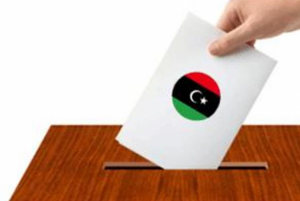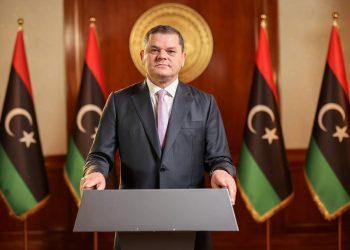By Sami Zaptia.

London, 20 September 2021:
Today, the Khaled Mishr-led High State Council (HSC) came up with alternative proposals for Libya’s 24 December parliamentary and presidential elections laws.
The latest filibustering move by Mishri and the HSC – in league with Khalifa Hafter and HoR head Ageela Saleh – seems like another nail in the coffin of this year’s planned 24 December elections.
Hiding behind fig leaves of legality and constitutionality and procedural rules, Libya’s status quo forces in western Libya, such as the (unelected) High State Council (HSC), are conspiring with their status quo counterparts in eastern Libya – Ageela Saleh and Hafter – to avoid the holding of elections.
They understand fully that If Libya fails to hold elections on time, it ensures that the HSC, the HoR and Hafter remains in situ for an even longer period of time.
Polarised politics of fear
This raises the question of whether the status quo forces prefer the current polarised political scene with Hafter serving as a convenient scarecrow. If Hafter is to disappear they would have no dictatorial ghoul with which to frighten their opponents. The continued presence of Hafter is as politically convenient for the status quo forces as the ‘‘terrorists, Islamists and militias’’ in western Libya are the convenient red rag for Hafter to wave in the east.
The anti-election forces in Libya reinforce each other’s existence. At one level they pretend to be political enemies. But on another level, they are allies in opposing elections. Hafter will almost certainly not be re-appointed to his position if a new parliament is elected and is based in the west. Equally, the HSC will no longer exist if there were elections.
The HSC is an unelected body born out of exceptional circumstances in the 2015 Skhirat Libyan Political Agreement (LPA).
A referendum on the constitution
That is why the HSC, in the name of political stability of course, have insisted on holding a referendum on the current constitution. A referendum that would take months to organize and that would probably reject the constitution.
And if the referendum does approve the constitution, the constitution would very likely be rejected in the courts as it was drafted without the consent of Libya’s ethnic minorities. The rules for drafting the constitution stipulate that all Libya’s minorities must be involved in the process. They were not. They pulled out in objection to the Arab majority in the Constitutional Drafting Authority (CDA) attempting to steamroll them.
Bicameral parliament to save the HSC?
And it is also the reason why the HSC have pulled out of the bag the brainstorming idea of creating a bicameral Libyan parliament at the next elections – to save their skins. The new ‘‘House of Lords’’ will be an unelected chamber with selected members. Guess who the HSC want it to be filled with? The HSC are looking for a deal that will extend their existence.
Ageela Saleh and Hafter are just as guilty
As implied throughout, Ageela Saleh and Khalifa Hafter are as much to blame as Mishri and his HSC. Ageela Saleh could be accused of being the worst offender. Leaving aside the diehard core of Hafter supporters, watching deliberations in parliament over the election law, most members came across as being genuine in attempting to draft an election law to hold elections and save Libya. Saleh proved he is either in the pocket of / or having a gun held to his head by Hafter (and his backers).
Saleh chose not to bring the presidential election law back to the floor from committee stage for what seemed a routine vote of approval. He chose himself and Hafter above the Libyan people by attempting to tailor the law to ensure he and Hafter can run for president – yet keep their current jobs if they fail.
On one level, Hafter and Saleh attempted to fashion a win-win scenario. They either win the elections or they return to their jobs. Nothing to lose. On another level, if Mishri and the HSC objected to their plan – they are still in their powerful and well paid positions.
The Libyan citizen is the net loser since 2011
Meanwhile, the poor Libyan public remains trapped since the 2011 revolution that toppled the Qaddafi regime in this quagmire of contested political legitimacy between their political elite. A contested legitimacy that has resulted in successive weak and ineffective governments that are unable to provide them with their basic needs such as water, electricity, fuel, healthcare, cash and security etc.
Messy democracy makes dictatorship and a strongman more palatable?
In the meantime, the longer the democratic process takes in Libya to settle down, the less local fans it has. As the chaos and instability continues, more and more Libyans are getting fed up with this democratic experiment. People are fed up and are so desperate for stability that they have forgotten all about the ideals they briefly dreamt of at the outbreak of the 2011 revolution.
The revisionist forces in Libya (and their international backers) understand this and the longer democracy fails in Libya the better chance for the alternative to make a comeback – at the expense of a democratic system.
Turkeys don’t vote for Christmas!
Ultimately, the HSC, Ageela Saleh and Hafter – and their international backers – know they are fighting an existentialist battle – and elections would be their doom. They have no interest in holding elections – because Turkeys don’t vote for Christmas!
Op-Ed: Hafter and HSC conspiring against elections in existentialist fight | (libyaherald.com)
HNEC confirms that it has received controversial HoR head of state election law | (libyaherald.com)
HoR Committee completes drafts of 2021 election laws at Rome meeting | (libyaherald.com)
HoR Committee arrives in Rome for four-day deliberations on election laws | (libyaherald.com)







